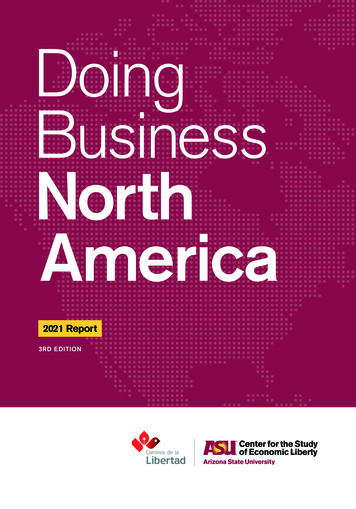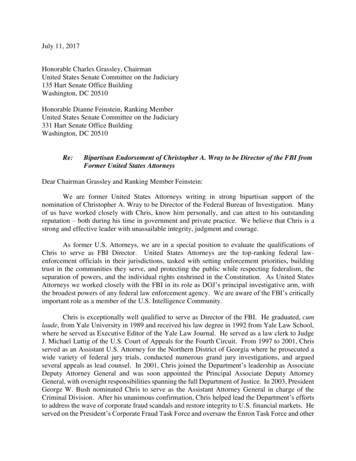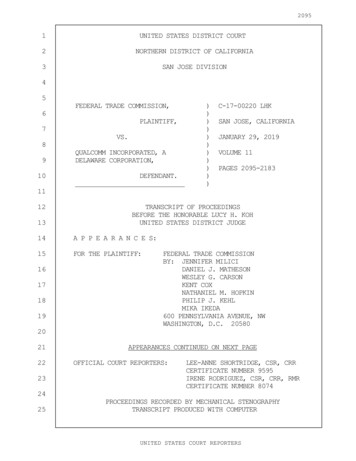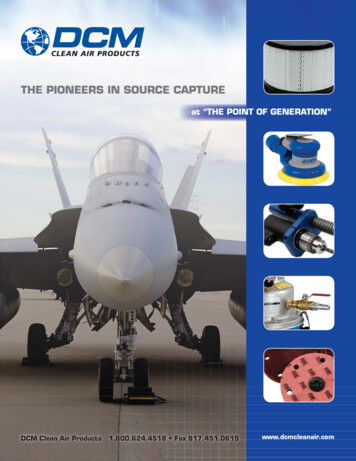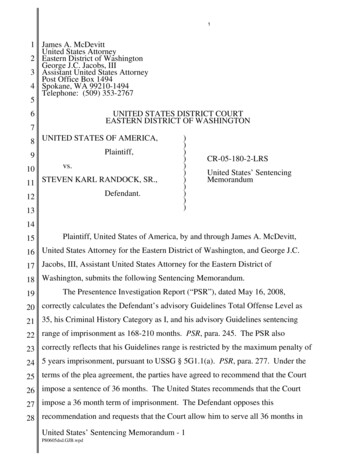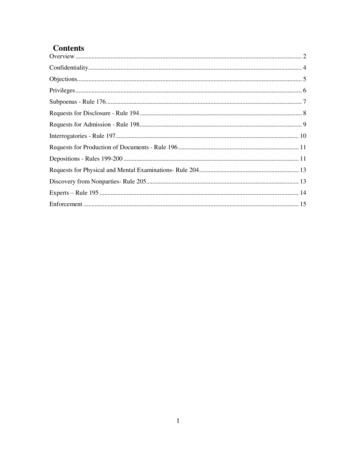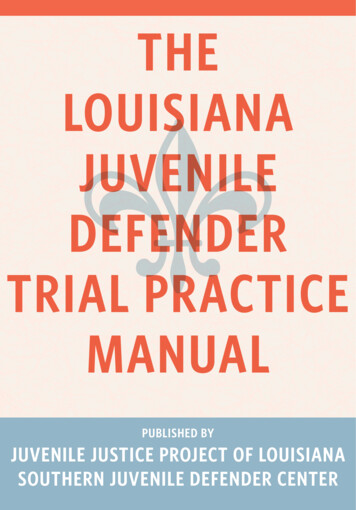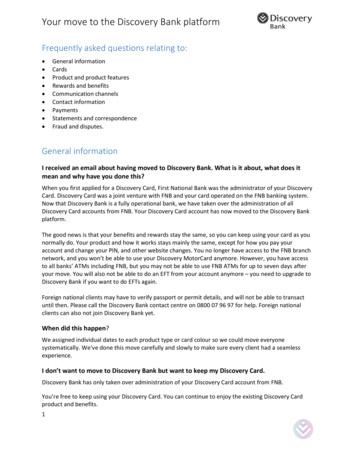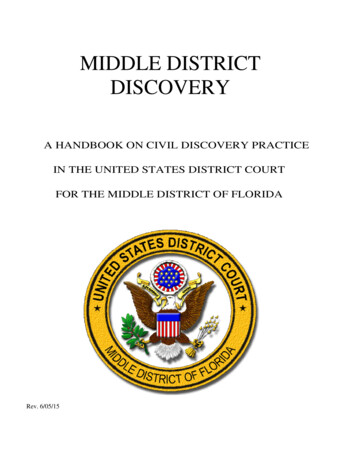
Transcription
MIDDLE DISTRICTDISCOVERYA HANDBOOK ON CIVIL DISCOVERY PRACTICEIN THE UNITED STATES DISTRICT COURTFOR THE MIDDLE DISTRICT OF FLORIDARev. 6/05/15
IntroductionThe Federal Rules of Civil Procedure, the Local Rules of the Middle District of Florida, and existingcase law cover only some aspects of civil discovery practice. Many of the gaps have been filled by theactual practice of trial attorneys and, over the years, a custom and usage has developed in this districtin frequently recurring discovery situations. Originally developed by a group of trial attorneys, thishandbook on civil discovery practice in the United States District Court, Middle District of Florida,updated in 2001, and again in 2015, attempts to supplement the rules and decisions by capturing thiscustom and practice. This handbook is neither substantive law nor inflexible rule; it is an expression ofgenerally acceptable discovery practice in the Middle District. It is revised only periodically and shouldnot be relied on as an up-to-date reference regarding the Federal Rules of Civil Procedure, the LocalRules for the Middle District of Florida, or existing case law. Judges and attorneys practicing in theMiddle District should regard the handbook as highly persuasive in addressing discovery issues.Parties who represent themselves (“pro se”) will find the handbook useful as they are also subject tothe rules and court orders and may be sanctioned for non-compliance. Judges may impose specificdiscovery requirements in civil cases, by standing order or case-specific order. This handbook doesnot displace those requirements, but provides a general overview of discovery practice in the MiddleDistrict of Florida.[The revised handbook has been reviewed and approved by the Magistrate and District Judges of theCourt.]-The Judges of the Middle DistrictCite this text as: Middle District Discovery (2015) at .The Local Rules for the Middle District of Florida can be found at www.flmd.uscourts.gov.1 PageDiscovery PracticeMiddle District of Florida – rev. 6/5/15
TABLE OF CONTENTSA.Courtesy and Cooperation Among Counsel . 3B.Duty of Disclosure . 4C.Filing of Discovery Materials and Other Discovery Considerations . 4D.Supplementing Answers . 5E.Timeliness and Sanctions . 5F.Completion of Discovery . 6II.DEPOSITIONS . 6A.General Policy and Practice . 6B.Objections . 8C.Production of Documents at Depositions . 9D.Non-Stenographic Recording of Depositions . 10E.Experts . 10III.PRODUCTION OF DOCUMENTS . 11A.Preparation and Interpretation of Requests for Documents . 11B.Procedures Governing Manner of Production . 14IV.INTERROGATORIES . 16A.Preparation and Answering of Interrogatories . 16B.Objections, Privilege, and Responses . 16C.Other Interrogatory Issues . 17V.SUBPOENAS . 18A.General . 18B.Contents of Subpoena . 19C.Other Requirements for Service of Subpoena . 19VI.PRIVILEGE . 20A.Invocation of Privilege or Other Protection . 20B.Procedure for Resolving Claims of Privilege or Other Protection Against Discovery with the Court . 22VII.MOTIONS TO COMPEL, FOR A PROTECTIVE ORDER, OR TO QUASH . 22A.Reference to Local Rule 3.04 . 22B.Effect of Filing a Motion for a Protective Order . 22C.Motion for Stipulated Protective Order . 23VIII.E-DISCOVERY . 23A.General . 23B.Preservation . 23C.Proportionality . 24D.ESI Conference. 242 PageDiscovery PracticeMiddle District of Florida – rev. 6/5/15
I.A.1-E.Procedure . 25F.Resolving Discovery Disputes . 26G.Discovery from Non-Parties . 26H.Metadata . 27DISCOVERY IN GENERALCourtesy and Cooperation Among CounselCourtesy. Discovery in this district should be practiced with a spirit of cooperation and civility. The district’sattorneys and the Court are justifiably proud of the courteous practice that is traditional in the Middle District.2-Certificate of Good Faith Conference. Before filing any motion in a civil case, except a motion for injunctiverelief, for judgment on the pleadings, for summary judgment, to dismiss or to permit maintenance of a classaction, to dismiss for failure to state a claim upon which relief can be granted, or to involuntarily dismiss anaction, the moving party shall confer with counsel for the opposing party in a good faith effort to resolve theissues raised by the motion, and shall file with the motion a statement (1) certifying that the moving counselhas conferred with opposing counsel and (2) stating whether counsel agree on the resolution of the motion.A certification to the effect that opposing counsel was unavailable for a conference before filing a motion isinsufficient to satisfy the parties’ obligation to confer. The moving party retains the duty to contact opposingcounsel expeditiously after filing and to supplement the motion promptly with a statement certifying whetheror to what extent the parties have resolved the issue(s) presented in the motion. If the interested partiesagree to all or part of the relief sought in any motion, the caption of the motion shall include the word“unopposed,” “agreed,” or “stipulated” or otherwise succinctly inform the reader that, as to all or part of therequested relief, no opposition exists. Local Rule, 3.01(g), Middle District of Florida.The term "confer" in Rule 3.01(g) means a substantive discussion. Counsel must respond promptly toinquiries and communication from opposing counsel. Many potential discovery disputes are resolved (orthe differences narrowed or clarified) when counsel confer in good faith. Rule 3.01(g) is strictly enforced.A motion that does not comply with the rule may be summarily denied.3-Scheduling. An attorney shall reasonably attempt to accommodate the schedules of opposing counsel,parties, and witnesses in scheduling discovery.4-Stipulations. Unless contrary to Rule 29, Federal Rules of Civil Procedure, the parties may stipulate inwriting in accordance with Local Rule 4.15, Middle District of Florida, to alter, amend, or modify any practicewith respect to discovery. However, any such stipulations do not relieve the parties from compliance withcourt orders, absent approval of the Court.3 PageDiscovery PracticeMiddle District of Florida – rev. 6/5/15
5-Withdrawal of Motions. If counsel resolve their differences and render a pending discovery motion moot,the moving party should immediately file a notice of withdrawal of the motion in order to avoid unnecessaryjudicial labor.B.Duty of DisclosureAttorneys are responsible for complying with the provisions of Rule 26(a), Federal Rules of Civil Procedure,regarding required disclosures unless modified by Court order or Local Rule.C.1-Filing of Discovery Materials and Other Discovery ConsiderationsGeneral Rule Governing Filing of Discovery Materials. In accordance with Local Rule 3.03(c) - (e), MiddleDistrict of Florida, copies of written interrogatories, answers and objections to interrogatories, notices oforal depositions, transcripts of oral depositions, requests for the production of documents and other things,responses to requests for production, matters disclosed pursuant to Rule 26(a)(1), Federal Rules of CivilProcedure, requests for admissions, and responses to requests for admissions shall not be filed with theCourt as a matter of course. Discovery materials are filed only in limited circumstances, including if orderedby the Court, if necessary to the presentation or defense of a motion, or if required by law or rule.Correspondence exchanged during the course of litigation either between opposing counsel or betweencounsel for one party and an unrepresented party should be filed with the Court only to comply with anorder of the Court or when necessary to the presentation and consideration of a motion and only when thefiling of traditional discovery material will clearly not suffice for the purpose. Counsel should carefully redactcorrespondence to exclude irrelevant and prejudicial material, e.g., settlement discussions.2-Filing Discovery or Other Papers Under Seal. In certain rare circumstances involving trade secrets or otherconfidential information, the Court may order the filing under seal of discovery in order to preserve theintegrity of the information. However, the Court wishes to minimize the number of documents filed underseal. Applicable precedent allows the Court to file documents under seal only in certain limitedcircumstances. Therefore, no paper may be filed under seal without prior approval by the Court inaccordance with Local Rule 1.09, and upon the demonstration of a sufficient legal and factual basis.3-Tailoring Discovery Requests to the Needs of the Case. A party should tailor discovery requests to theneeds of each case. The content of the requests should apply to the particular case, and the form ofdiscovery requested should be the one best suited to obtain the information sought. In each case a partyshould carefully determine which discovery methods will achieve the discovery goal of obtaining useful4 PageDiscovery PracticeMiddle District of Florida – rev. 6/5/15
information as efficiently and inexpensively as possible for everyone concerned.4-Responding to Discovery Requests. A party responding to a discovery request should make diligent effortto provide a response that (i) fairly meets and complies with the discovery request and (ii) imposes nounnecessary burden or expense on the requesting party.D.Supplementing AnswersRule 26(e), Federal Rules of Civil Procedure, expressly provides that in many instances a party is under aduty to supplement or correct prior disclosures pursuant to Rule 26(a) or in discovery responses. Fairnessand professionalism suggest a broader range of circumstances requiring supplementation. However, aparty may not vary the provisions of the Federal Rules of Civil Procedure by placing supplementationlanguage in a discovery request.E.1-Timeliness and SanctionsTimeliness of Discovery Responses. The Federal Rules of Civil Procedure set forth explicit time limits forresponding to discovery requests. If unable to answer timely, an attorney should first seek an informalextension of time from counsel propounding the discovery. Counsel in this district typically accommodatereasonable requests for additional time. If unable to informally resolve the matter, counsel should move foran extension of time to respond. (See Local Rule 3.01(g), Middle District of Florida, requiring a certificatethat counsel have conferred before seeking judicial relief.)2-Motions for Extensions of Time. Motions for extension of time within which to respond to discovery shouldbe filed sparingly and only when counsel are unable to informally resolve their disputes. Counsel should beaware that the mere filing of a motion for an extension of time in which to respond does not, absent anorder of the Court, extend the deadline for responding to discovery requests.3-Sanctions. Rule 37, Federal Rules of Civil Procedure, provides that if a party must seek relief from the Courtto compel a recalcitrant party to respond, the moving party may be awarded reasonable expenses includingattorney’s fees incurred in compelling the responses. Rule 37 is enforced in this district. Further, if a Courtorder is obtained compelling discovery, unexcused failure to comply with such an order is treated by theCourt with special gravity and disfavor.4-Stays of Discovery. Normally, the pendency of a motion to dismiss or a motion for summary judgment willnot justify a unilateral motion to stay discovery pending resolution of the dispositive motion. Such motionsfor stay are rarely granted. However, unusual circumstances may justify a stay of discovery in a particular5 PageDiscovery PracticeMiddle District of Florida – rev. 6/5/15
case upon a specific showing of prejudice or undue burden. This policy also applies to cases referred toarbitration or mediation under the Local Rules.F.1-Completion of DiscoveryDeadline for Discovery Completion. The Court ordinarily sets a discovery completion date through its CaseManagement and Scheduling Order (“CMSO”) (although a Judge may have another method of setting andextending that deadline). The Court follows the rule that the completion date means that all discovery mustbe completed by that date. For example, interrogatories must be served more than thirty days prior to thecompletion date to permit the opposing party to respond before the discovery deadline. Untimely discoveryrequests are subject to objection on that basis. Counsel, by agreement, may conduct discovery after theformal completion date but should not expect the Court to resolve discovery disputes arising after thediscovery completion date.II.A.1-DEPOSITIONSGeneral Policy and PracticeScheduling. An attorney is expected to accommodate the schedules of opposing counsel. In doing so, theattorney should normally pre-arrange a deposition with opposing counsel before serving the notice. If thisis not possible, counsel may unilaterally notice the deposition while at the same time indicating a willingnessto be reasonable about any necessary rescheduling. Rule 30(a)(2)(A), Federal Rules of Civil Procedure,limits each side to no more than ten depositions unless otherwise ordered by the Court. Additionally, LocalRule 3.02 requires the party noticing the deposition to give a minimum of fourteen days’ written notice toevery other party and the deponent, absent agreement or an order based upon some exigent circumstance.And giving substantially more than fourteen days notice is strongly encouraged. Rule 30(d)(1) limits adeposition to one day of seven hours unless otherwise authorized by the Court or stipulated by the parties.This is generally interpreted to mean seven hours of actual testimony, and does not include time spent formeals, rest, or refreshment.2-Persons Who May Attend Depositions. Each attorney may ordinarily be accompanied at the deposition byone representative of each client and, in technical depositions, one or more experts. Business necessitymay require substitution for the representative of a party, but this privilege should not be abused. Attorneysmay also be accompanied by records custodians, paralegals, secretaries, and the like, even though theymay be called as technical witnesses on such questions as chain of custody, the foundation for the businessrecord rule, or other technical matters. While more than one attorney for each party may attend, only one6 PageDiscovery PracticeMiddle District of Florida – rev. 6/5/15
should question the witness or make objections, absent an agreement to the contrary. Those in attendanceshould conduct themselves in the manner expected during courtroom proceedings in the presence of ajudge. Conduct during depositions should accord with Local Rules 5.03(b)(7), (8), (9), (12), (13), and (16),Middle District of Florida.3-Place Where Deposition May Be Taken. Local Rule 3.04(b), Middle District of Florida, provides that a nonresident plaintiff may reasonably expect to be deposed at least once in this district during the discoverystages of the case and that a non-resident defendant who intends to be present in person at trial may bedeposed at least once in this district either during discovery in the case or within a week before trial, as thecircumstances suggest. A non-resident is defined by Local Rule 3.04(b) as a person residing outside thestate of Florida.4-Designations by an Organization of Someone to Testify on Its Behalf. In issuing or responding to a properlydrawn notice of deposition pursuant to Rule 30(b)(6), Federal Rules of Civil Procedure, counsel shouldadhere to the following guidelines:(a)Requested Areas of Testimony. A notice or subpoena to an entity, association, or otherorganization should accurately and concisely identify the designated area(s) of requestedtestimony, giving due regard to the nature, business, size, and complexity of the entity beingasked to testify.(b)Designating the Best Person to Testify for the Organization. An entity, association, or otherorganization responding to a deposition notice or subpoena should make a diligent inquiry todetermine the individual(s) best suited to testify.(c)Reasonable Interpretation Is Required. Both in preparing and in responding to a notice orsubpoena to an entity, association, or other organization, a party or witness is expected tointerpret the designated area(s) of inquiry in a reasonable manner consistent with the entity’sbusiness and operations.(d)If in Doubt, Clarification Is Appropriate. A responding party or witness, who is unclear about themeaning and intent of any designated area of inquiry, should communicate in a timely mannerwith the requesting party to clarify the matter so that the deposition may proceed as scheduled.The requesting party is obligated to provide clarification sufficient to permit informed, practical,and efficient identification of the proper witness.7 PageDiscovery PracticeMiddle District of Florida – rev. 6/5/15
(e)Duty to Prepare Witness. Counsel for the entity should prepare the designated witness so thatthe witness can provide meaningful information about the designated area(s) of inquiry.5-If an Officer Lacks Knowledge. Whenever an officer, director, or managing agent of an entity is served witha deposition notice or subpoena that contemplates testimony on a subject about which the witness lacksknowledge or information, that individual may submit to the noticing party, reasonably before the datenoticed for the deposition, an affidavit or declaration under penalty of perjury so stating and identifying aperson within the entity, if any, having knowledge of the subject matter. The noticing party should thenproceed with the deposition of the officer, director, or managing agent initially noticed or subpoenaed onlyafter careful consideration and for a specific reason, provided to the deponent in writing in advance of thedeposition.6-Consideration for an Organization’s Senior Management. If information is sought from an organization,counsel ordinarily should not seek in the first instance to take the deposition of the organization’s seniormanagement if someone else in the organization can be expected to have more direct and firsthandknowledge or information. Depositions are not properly used as a mechanism to inconvenience or distractsenior management who may not be immediately involved in the dispute.B.1-ObjectionsObjection to the Form of the Question. Rule 32(d)(3)(B), Federal Rules of Civil Procedure, provides that anobjection to the form of the question is waived unless asserted during the deposition. Many attorneys objectby simply stating "I object to the form of the question." This normally suffices because it is usually apparentthat the objection is, for example, "leading" or based upon an insufficient or inaccurate foundation. Theinterrogating attorney has a right to ask the objecting party to state a sufficiently specific objection so thatany problem with the question can be understood and, if possible, cured. If the interrogating attorneychooses not to ask for clarification, the objecting attorney should stand on the objection without furtherelaboration; the objection is preserved.2-Instruction That a Witness Not Answer. Occasionally during a deposition, an attorney may instruct adeponent not to answer a question. Rule 30(c)(2), Federal Rules of Civil Procedure, expressly providesthat an attorney may instruct a deponent not to answer only when necessary to preserve a privilege, toenforce a limitation established by the Court, or to present a motion to show that the examination is beingconducted in bad faith or in such a manner as unreasonably to annoy, embarrass, or oppress the deponentor party.The use of the instruction not to answer, absent the limited circumstances set forth in Rule 30(c)(2), FederalRules of Civil Procedure, is disfavored by the Court. A party or an attorney who improperly instructs a8 PageDiscovery PracticeMiddle District of Florida – rev. 6/5/15
deponent not to answer is subject to the expense and sanction provisions of Rule 37(a)(5).3-Attorney-Deponent Conference During Deposition. Except during routine recesses and for purposes ofdetermining the existence of a privilege, an attorney and a deponent should not normally confer during adeposition. Likewise, attorneys should not attempt to prompt a deponent by suggestive or unnecessarilynarrative objections.4-Attorney-Deponent Communication During a Recess. During a recess, an attorney for a deponent maycommunicate with the deponent; this communication should be deemed subject to the rules governing theattorney-client privilege. If, as a result of a communication between the deponent and his or her attorney,a decision is made to clarify or correct testimony previously given by the deponent, the deponent or theattorney for the deponent should, promptly upon the resumption of the deposition, bring the clarification orcorrection to the attention of the examining attorney. The examining attorney should not attempt to inquireinto communications between the deponent and the attorney for the deponent that are protected by theattorney-client privilege. The examining attorney may inquire as to the circumstances that led to anyclarification or correction, including inquiry into any matter that was used to refresh the deponent’srecollection.5-Telephone Hearing to Resolve Disputes During Deposition. In unusual circumstances with material andadverse consequences, the parties involved in a deposition may telephone the chambers of the assignedMagistrate Judge for resolution of an intractable dispute that has arisen during the deposition. TheMagistrate Judge, if available, will entertain such a request only if all parties are present. This procedureshould be employed rarely (and only after counsel have made every effort to resolve the dispute).C.1-Production of Documents at DepositionsScheduling. Consistent with the requirements of Rules 30 and 34, Federal Rules of Civil Procedure, a partyseeking production of documents and other matters from another party in connection with a depositionshould schedule the deposition to allow for the production in advance of the deposition.2-Option to Adjourn or Proceed. If requested documents that are discoverable are not timely produced priorto the deposition, the party noticing the deposition may either adjourn the deposition until after suchdocuments are produced or, without waiving the right to have access to the documents and to subsequentlyexamine the deponent regarding the documents, proceed with the deposition.3-Non-Parties. For non-parties, a subpoena is required to obtain documents or testimony. (see section V)9 PageDiscovery PracticeMiddle District of Florida – rev. 6/5/15
D.Non-Stenographic Recording of DepositionsRule 30(b), Federal Rules of Civil Procedure, provides that parties are authorized to record depositiontestimony by non-stenographic means without first obtaining permission of the Court or agreement fromother counsel. Rule 30(b)(3)(A) states that the party taking the deposition shall state in the notice themethod by which the testimony shall be recorded. Unless the Court orders otherwise, the testimony maybe recorded by audio, audiovisual, or stenographic means, and the party taking the deposition shall bearthe costs of recording. Rule 30(b)(3)(B) allows any party to designate an additional method to record thedeponent’s testimony so long as prior notice is provided to the deponent and other parties. The additionalrecord or transcript shall be made at the designating party’s expense unless the Court orders otherwise.A party choosing to record a deposition only by videotape or audiotape should understand that a transcriptwill be required by Rules 26(a)(3)(A)(ii) and 32(c), Federal Rules of Civil Procedure, if the deposition is laterto be offered as evidence at trial or in conjunction with a Rule 56 motion. Objections to the non-stenographicrecording of a deposition may be presented to the Court under the provisions of Rule 26(c).Parties using non-stenographic means to record deposition testimony shall refer to Rule 30(b)(4), FederalRules of Civil Procedure, for specific procedures to ensure proper recording.E.1-ExpertsDisclosure and Reports of Expert Witnesses. Each party should disclose the identity of prospective retainedexpert witnesses and provide a complete expert report under Rule 26(a)(2), Federal Rules of CivilProcedure, within the time provided in the Court’s Case Management and Scheduling Order (which oftenadopts the schedule proposed by the parties in the Case Management Report). This includes any expertwitness retained by another party (such as a co-defendant’s expert) who may be used by the disclosingparty. The expert report is not required of a "hybrid" witness, such as a treating physician, who was notspecifically retained for the litigation and will provide both fact and expert testimony (though non-retainedexperts must still be disclosed and are subject to regular document and deposition discovery). The partiesare encouraged to communicate openly about all opinions that a treating physician is expected to renderin support of a party's case.Rule 26(b)(4)(C), Federal Rules of Civil Procedure, requires:Unless otherwise stipulated or ordered by the court, if the witness is not10 P a g eDiscovery PracticeMiddle District of Florida – rev. 6/5/15
required to provide a written report, this disclosure must state: (i) the subjectmatter on which the witness is expected to present evidence under FederalRule of Evidence 702, 703, or 705; and (ii) a summary of the facts andopinions to which the witness is expected to testify.2-Scheduling the Deposition. Pursuant to Rule 26(b)(4)(A), Federal Rules of Civil Procedure
language in a discovery request. E. Timeliness and Sanctions . 1 - Timeliness of Discovery Responses. The Federal Rules of Civil Procedure set forth explicit time limits for responding to discovery requests. If unable to answer timely, should first seek an informal an attorney extension of time from counsel propounding the discovery.


